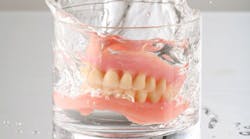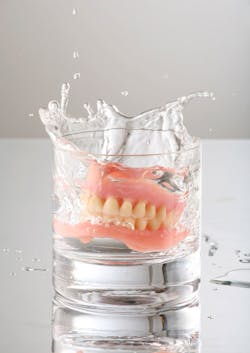Dental coding with Kyle—Immediate denture (D5130) vs. interim complete denture (D5810)
It’s no secret that dental coding can be a tricky and frustrating experience. DAOMD editor Kyle Summerford explains different codes in his monthly Dental Coding with Kyle column in an effort to help alleviate some of the frustration for his fellow dental professionals.
This article first appeared in Dental Assisting & Office Manager Digest. To receive enlightening and helpful articles for assistants and office managers in this monthly e-newsletter, visit dentistryiq.com/subscribe.
Both immediate dentures and interim complete dentures are considered for temporary usage, but do you know the key differences?
Temporary dentures are typically fabricated because the patient will be having multiple extractions on a single visit and/or implant placement. The denture is usually made as a temporary and placed immediately in the mouth for cosmetic reasons at the restorative dentist’s discretion.
Immediate denture (D5130)—Includes limited follow-up care only. Does not include required future rebasing/relining procedure(s) or a complete new denture.
Interim complete denture (D5810)
Key differences:
• You usually receive a higher reimbursement for an interim/immediate denture than for a complete denture (D5110).
• Reimbursement for the temporary denture can later be deducted from the permanent denture.
• Billing the insurance company for reimbursement on the date of denture impression is inaccurate and fraudulent. You should only bill for reimbursement on the date the denture is inserted.
• Neither an interim or immediate denture reimbursement fee includes a reline or rebase. These services should be billed for separately at a later time.
• Denture adjustments are usually considered inclusive of the denture fee for up to six months from the date of insertion.
• Reimbursement for procedures related to either of the two dentures, interim/immediate denture, will not usually be reimbursed until six months later or later.
• Diagnostic casts are not usually reimbursed and are typically denied as they are considered inclusive.
• There is usually a 60-month limitation exclusion that applies to fabrication of a new denture if there is an existing prosthesis in the mouth.
Be sure to always send in for preauthorization to ensure a swift claim process.
MORE CODING WITH KYLE ARTICLES:
Bone grafts
What code to use for dental exam visit?
D4249–clinical crown lengthening
For the most current dental headlines, click here.
About the Author

Kyle L. Summerford
With more than 22 years of experience in dental, Kyle L. Summerford has a unique approach to case presentation and patient acceptance. As an OM and financial dental consultant, he leverages his knowledge to assist new and struggling dental practices. Through his education programs, Kyle empowers staff members with effective patient education skills and persuasion techniques. He has lectured at CE events and academic institutions. His expertise is further recognized through his column, Dental Coding with Kyle. He’s the founder of the Dental Office Managers Community. Visit his website at kylesummerford.com.


